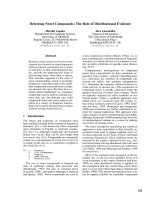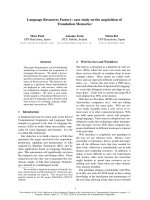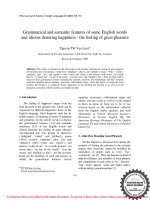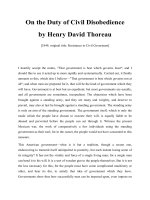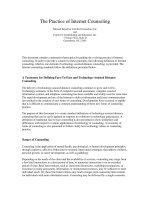The Politics of Aid Selectivity potx
Bạn đang xem bản rút gọn của tài liệu. Xem và tải ngay bản đầy đủ của tài liệu tại đây (1.23 MB, 209 trang )
The Politics of Aid Selectivity
With the ending of the political dichotomy in world politics around 1990, the
good governance principle came to occupy an important position in judgements
about political regimes in developing countries. Good governance became an
important objective in the policies of many aid-giving Western countries and the
main international financial institutions, such as the World Bank. Increasingly,
however, good governance and market-oriented economic reform came to be
subsumed under one heading, leading to what has been called a post-Washington
Consensus.
This book describes in detail the policies of aid selectivity adopted by the
World Bank, the Netherlands and the United States since the end of the 1990s.
The main assumptions underlying the policies, as well as the key decisions
related to the selection of developing countries, are analysed and critically eval-
uated. A comparison is made between policy making in these three cases and
different approaches to selectivity in the United Kingdom. The book brings out
the conflicts that may exist between foreign assistance agendas and the desire of
governments in developing countries to set priorities for their national develop-
ment policies.
The Politics of Aid Selectivity is the first extended analysis of selectivity pol-
icies of important bilateral and multilateral aid donors and combines a policy-
analytical with a quantitative-empirical approach. The book is relevant to
students of various sub-fields of development studies and policy analysis, among
other areas, and also has international appeal to researchers and policy-makers
working in the area of foreign assistance.
Wil Hout is an Associate Professor of World Development at the Institute of
Social Studies in The Hague and currently serves as Dean of the Institute. He is
the author of Capitalism and the Third World, co-editor (with Jean Grugel) of
Regionalism Across the North–South Divide and co-editor of three Dutch-
language volumes on issues of international relations and political science.
Routledge studies in development economics
1 Economic Development in the
Middle East
Rodney Wilson
2 Monetary and Financial Policies
in Developing Countries
Growth and stabilization
Akhtar Hossain and Anis
Chowdhury
3 New Directions in Development
Economics
Growth, environmental concerns
and government in the 1990s
Edited by Mats Lundahl and
Benno J. Ndulu
4 Financial Liberalization and
Investment
Kanhaya L. Gupta and
Robert Lensink
5 Liberalization in the Developing
World
Institutional and economic
changes in Latin America, Africa
and Asia
Edited by
Alex E. Fernández Jilberto and
André Mommen
6 Financial Development and
Economic Growth
Theory and experiences from
developing countries
Edited by Niels Hermes and
Robert Lensink
7 The South African Economy
Macroeconomic prospects for the
medium term
Finn Tarp and Peter Brixen
8 Public Sector Pay and
Adjustment
Lessons from five countries
Edited by Christopher Colclough
9 Europe and Economic Reform
in Africa
Structural adjustment and
economic diplomacy
Obed O. Mailafia
10 Post-apartheid Southern Africa
Economic challenges and policies
for the future
Edited by Lennart Petersson
11 Financial Integration and
Development
Liberalization and reform in sub-
Saharan Africa
Ernest Aryeetey and
Machiko Nissanke
12 Regionalization and
Globalization in the Modern
World Economy
Perspectives on the Third World
and transitional economies
Edited by Alex E. Fernández
Jilberto and André Mommen
13 The African Economy
Policy, institutions and the future
Steve Kayizzi-Mugerwa
14 Recovery from Armed Conflict
in Developing Countries
Edited by Geoff Harris
15 Small Enterprises and Economic
Development
The dynamics of micro and small
enterprises
Carl Liedholm and
Donald C. Mead
16 The World Bank
New agendas in a changing world
Michelle Miller-Adams
17 Development Policy in the
Twenty-first Century
Beyond the post-Washington
consensus
Edited by Ben Fine,
Costas Lapavitsas and
Jonathan Pincus
18 State-Owned Enterprises in the
Middle East and North Africa
Privatization, performance and
reform
Edited by Merih Celasun
19 Finance and Competitiveness in
Developing Countries
Edited by José María Fanelli and
Rohinton Medhora
20 Contemporary Issues in
Development Economics
Edited by B.N. Ghosh
21 Mexico Beyond NAFTA
Edited by Martín Puchet Anyul
and Lionello F. Punzo
22 Economies in Transition
A guide to China, Cuba, Mongolia,
North Korea and Vietnam at the
turn of the twenty-first century
Ian Jeffries
23 Population, Economic Growth
and Agriculture in Less
Developed Countries
Nadia Cuffaro
24 From Crisis to Growth in
Africa?
Edited by Mats Lundal
25 The Macroeconomics of
Monetary Union
An analysis of the CFA franc zone
David Fielding
26 Endogenous Development
Networking, innovation,
institutions and cities
Antonio Vasquez-Barquero
27 Labour Relations in Development
Edited by Alex E. Fernández
Jilberto and Marieke Riethof
28 The Crisis of Rural Poverty and
Hunger
An essay on the complementarity
between market and
government-led land reform for its
resolution
M. Riad El-Ghonemy
29 Globalization, Marginalization
and Development
Edited by S. Mansoob Murshed
30 Programme Aid and
Development
Beyond conditionality
Howard White and Geske Dijkstra
31 Competitiveness Strategy in
Developing Countries
A manual for policy analysis
Edited by Ganeshan Wignaraja
32 The African Manufacturing
Firm
An analysis based on firm surveys
in sub-Saharan Africa
Dipak Mazumdar and
Ata Mazaheri
33 Trade Policy, Growth and
Poverty in Asian Developing
Countries
Edited by Kishor Sharma
34 International Competitiveness,
Investment and Finance
A case study of India
Edited by A. Ganesh Kumar,
Kunal Sen and Rajendra R. Vaidya
35 The Pattern of Aid Giving
The impact of good governance on
development assistance
Eric Neumayer
36 New International Poverty
Reduction Strategies
Edited by Jean-Pierre Cling,
Mireille Razafindrakoto and
François Roubaud
37 Targeting Development
Critical perspectives on the
Millennium Development Goals
Edited by Richard Black and
Howard White
38 Essays on Balance of Payments
Constrained Growth
Theory and evidence
Edited by J.S.L. McCombie and
A.P. Thirlwall
39 The Private Sector after
Communism
New entrepreneurial firms in
transition economies
Jan Winiecki, Vladimir Benacek
and Mihaly Laki
40 Information Technology and
Development
A new paradigm for delivering the
Internet to rural areas in
developing countries
Jeffrey James
41 The Economics of Palestine
Economic policy and institutional
reform for a viable Palestine state
Edited by David Cobham and
Nu’man Kanafani
42 Development Dilemmas
The methods and political ethics
of growth policy
Melvin Ayogu and Don Ross
43 Rural Livelihoods and Poverty
Reduction Policies
Edited by Frank Ellis and
H. Ade Freeman
44 Beyond Market-Driven
Development
Drawing on the experience of Asia
and Latin America
Edited by Makoto Noguchi and
Costas Lapavitsas
45 The Political Economy of
Reform Failure
Edited by Mats Lundahl and
Michael L. Wyzan
46 Overcoming Inequality in Latin
America
Issues and challenges for the
twenty-first century
Edited by Ricardo Gottschalk and
Patricia Justino
47 Trade, Growth and Inequality
in the Era of Globalization
Edited by Kishor Sharma and
Oliver Morrissey
48 Microfinance
Perils and prospects
Edited by Jude L. Fernando
49 The IMF, World Bank and
Policy Reform
Edited by Alberto Paloni and
Maurizio Zanardi
50 Managing Development
Globalization, economic
restructuring and social policy
Edited by Junji Nakagawa
51 Who Gains from Free
Trade?
Export-led growth, inequality and
poverty in Latin America
Edited by Rob Vos,
Enrique Ganuza, Samuel Morley,
and Sherman Robinson
52 Evolution of Markets and
Institutions
A study of an emerging economy
Murali Patibandla
53 The New Famines
Why famines exist in an era of
globalization
Edited by Stephen Devereux
54 Development Ethics at work
Explorations – 1960–2002
Denis Goulet
55 Law Reform in Developing and
Transitional States
Edited by Tim Lindsey
56 The Asymmetries of
Globalization
Edited by Pan A. Yotopoulos and
Donato Romano
57 Ideas, Policies and Economic
Development in the Americas
Edited by Esteban Pérez-
Caldentey and Matias Vernengo
58 European Union Trade Politics
and Development
‘Everything but arms’ unravelled
Edited by Gerrit Faber and
Jan Orbie
59 Membership Based
Organizations of the Poor
Edited by Martha Chen,
Renana Jhabvala, Ravi Kanbur
and Carol Richards
60 The Politics of Aid Selectivity
Good governance criteria in World
Bank, US and Dutch development
assistance
Wil Hout
The Politics of Aid Selectivity
Good governance criteria in World Bank,
US and Dutch development assistance
Wil Hout
First published 2007
by Routledge
2 Park Square, Milton Park, Abingdon, Oxon OX14 4RN
Simultaneously published in the USA and Canada
by Routledge
270 Madison Ave, New York, NY 10016
Routledge is an imprint of the Taylor & Francis Group, an informa business
© 2007 Wil Hout
All rights reserved. No part of this book may be reprinted or reproduced or
utilised in any form or by any electronic, mechanical, or other means, now
known or hereafter invented, including photocopying and recording, or in
any information storage or retrieval system, without permission in writing
from the publishers.
British Library Cataloguing in Publication Data
A catalogue record for this book is available from the British Library
Library of Congress Cataloging in Publication Data
A catalog record for this book has been requested
ISBN10: 0-415-37860-5 (hbk)
ISBN10: 0-203-94578-6 (ebk)
ISBN13: 978-0-415-37860-4 (hbk)
ISBN13: 978-0-203-94578-0 (ebk)
This edition published in the Taylor & Francis e-Library, 2007.
“To purchase your own copy of this or any of Taylor & Francis or Routledge’s
collection of thousands of eBooks please go to www.eBookstore.tandf.co.uk.”
ISBN 0–203–94578–6 Master e-book ISBN
For Sophie and Oscar
Contents
List of illustrations xiv
List of acronyms xvi
Preface and acknowledgements xviii
1 Introduction 1
1.1 The emergence of the ‘good governance’ agenda 1
1.2 The reinvention of development assistance 2
1.3 Aid selectivity 4
1.4 Outline of the book 5
2 The paradigm shift in development assistance 10
2.1 Introduction 10
2.2 Reorientations in economic theory 12
2.3 The rethinking of development policies 16
2.4 Good governance and aid effectiveness 19
2.5 Conclusions 21
3 The World Bank and performance-based allocation 24
3.1 Introduction 24
3.2 The World Bank and governance 25
3.3 Governance and performance-based allocation 28
3.4 Evaluation 40
3.5 Conclusions 48
4 The Netherlands and the selection of recipient countries 50
4.1 Introduction 50
4.2 First steps: the selection of preferential countries
(1998–2002) 51
4.3 A change of course: the reduction to 36 partner countries
(2003–7) 58
4.4 Evaluation 61
4.5 Conclusions 68
5 The United States and the Millennium Challenge Account 70
5.1 Introduction 70
5.2 Foreign aid and governance: the US political and
institutional framework 71
5.3 The Millennium Challenge Account 74
5.4 Evaluation 89
5.5 Conclusions 95
6 Selectivity and good governance in the United Kingdom,
Denmark and the European Union 97
6.1 Introduction 97
6.2 Assistance policies of the United Kingdom 98
6.3 Assistance policies of Denmark 103
6.4 Assistance policies of the European Union 106
6.5 Conclusions 113
7 Quantitative-empirical analyses of World Bank, Dutch and
US aid selectivity 115
7.1 Introduction 115
7.2 Research design and methodology 115
7.3 World Bank 119
7.4 The Netherlands 123
7.5 The United States 127
7.6 Conclusions 131
8 Conclusion 134
8.1 The challenge of aid selectivity 134
8.2 Governance quality and aid effectiveness 135
8.3 Definitions of governance 136
8.4 Causes of ‘bad’ governance 137
xii Contents
8.5 Methodology and quantification 138
8.6 Bias towards selection 140
8.7 Indeterminacy of governance quality 140
8.8 The importance of poverty reduction 141
Appendix A: Interviews 143
Appendix B: The Country Policy and Institutional
Assessment (CPIA) 144
Appendix C: IDA borrowers, by per capita income, 1999 151
Appendix D: Selection criteria of the Millennium Challenge
Account 153
Appendix E: Low-income and lower-middle-income
countries in the analyses 157
Notes 159
Bibliography 167
Index 182
Contents xiii
Illustrations
Figures
3.1 IDA’s performance-based allocation mechanism under
IDA14 41
5.1 Stages of the MCA compact development process 87
Tables
2.1 The paradigm shift in the international aid agenda 22
3.1 IDA allocations and commitments by performance quintile,
2000 lending strategy 34
4.1 Criteria for country selection 54
4.2 Allocation of delegated ODA funds, 2000 57
4.3 Official Development Assistance allocated to partner and exit
countries, 2004 62–3
5.1 MCA’s budget, 2004–7 79
5.2 Selection criteria of the Millennium Challenge Account 80
5.3 Eligible, threshold and compact countries, fiscal years 2004–6 82
5.4 Signed Millennium Challenge Compacts, 2004–6 86
5.5 Millennium Challenge Compacts, allocation by type of
activity 88
6.1 Major recipients in the UK’s country aid programme, 2005/6 99
6.2 Major recipients of Danish development assistance, 2004 105
6.3 Regional breakdown of commitments of external assistance
managed by EuropeAid and DG Enlargement, 2001 and 2005 110
6.4 Major recipients of EU Official Development Assistance,
2005 111
6.5 Sectoral and regional breakdown of commitments of external
assistance managed by EuropeAid, 2005 112
7.1 World Bank, eligibility stage 120
7.2 World Bank, level stage 122
7.3 The Netherlands, eligibility stage 124
7.4 The Netherlands, level stage 125
7.5 The US Millennium Challenge Account, eligibility stage 128
7.6 The US Millennium Challenge Account and USAID,
level stage 130
B1 Categories and judgements on the CPIA, 1999–2004 147
B2 Categories and judgements on the CPIA, since 2005 150
Illustrations xv
Acronyms
ACP group of African, Caribbean and Pacific countries (European
Union)
ARPP Annual Report on Portfolio Performance (World Bank)
CAS Country Assistance Strategy (World Bank)
CDF Comprehensive Development Framework (World Bank)
CEO chief executive officer
CPIA Country Policy and Institutional Assessment (World Bank)
CPR Country Performance Rating (World Bank)
DAC Development Assistance Committee of the Organisation for
Economic Co-operation and Development
DFID Department for International Development (United
Kingdom)
DGIS Directorate-General for International Cooperation (the
Netherlands)
EDF European Development Fund (European Union)
EPA Economic Partnership Agreement (European Union)
EU European Union
FY fiscal year
G-7 group of seven major industrialised countries (United States,
Japan, Germany, United Kingdom, France, Italy and Canada)
GAO Government Accountability Office (United States)
GDP gross domestic product
GMV governance, human rights and peace-building (the
Netherlands)
GNP gross national product
HIPC highly indebted poor countries
IBRD International Bank for Reconstruction and Development
(World Bank)
ICP IDA Country Performance
IDA International Development Association (World Bank)
LICUS low income country under stress (World Bank)
LPF Lijst Pim Fortuyn (the Netherlands)
MCA Millennium Challenge Account (United States)
MCC Millennium Challenge Corporation (United States)
MDGs Millennium Development Goals
MEPI Middle East Partnership Initiative (United States)
NGO non-governmental organisation
ODA official development assistance
OECD Organisation for Economic Co-operation and Development
OED Operations Evaluation Department (World Bank)
PBA performance-based allocation (World Bank)
PCPI Post-Conflict Progress Indicators (World Bank)
PEFPAR President’s Emergency Plan for AIDS Relief (United States)
PRBS Poverty Reduction Budget Support (United Kingdom)
PREM network Poverty Reduction and Economic Management network
(World Bank)
PRS(P) Poverty Reduction Strategy (Paper)
PSA Public Service Agreement (United Kingdom)
SDR Special Drawing Rights (International Monetary Fund)
SFRC Senate Foreign Relations Committee (United States)
SWAp sector-wide approach
UNDP United Nations Development Programme
USAID United States Agency for International Development
Acronyms xvii
Preface and acknowledgements
This book is about the recent trend in development assistance policies to be
more selective in the choice of countries that receive aid. The approach derives
its theoretical legitimacy from claims made in the donor community where aid
works, but only in contexts characterised by ‘good’ governance and policies.
The focus on the quality of governance and policies in developing countries rep-
resents a policy reorientation of some major bilateral and multilateral aid donors,
which is politically very significant. Aid selectivity has been introduced with the
explicit aim to give new legitimacy to development assistance policies that had
come under attack in the 1980s and 1990s.
This book aims to analyse the policies of aid selectivity adopted by three
donors: the World Bank, the Netherlands and the United States. It is felt that an
analysis of the policy theories held by these donors and of the ways in which
selectivity policies have been implemented over the last decade is called for in
order to shed light on the validity of the policy reorientation. This study is built
around case studies of the donors’ policies, based on a review of policy docu-
ments and interviews, as well as a quantitative-empirical analysis of policy
choices related to the selection of aid recipients and the allocation of aid over the
recipient countries.
Several paragraphs of Chapters 1, 3, 4, 5 and 8 have been based on my article
‘Political Regimes and Development Assistance: The Political Economy of Aid
Selectivity’, which appeared in Critical Asian Studies 36(4): 591–613. For
Chapter 4, I have drawn on my article ‘The Netherlands and Aid Selectivity,
1998–2005: The Vicissitudes of a Policy Concept’, which was published in the
Netherlands Yearbook on International Cooperation (Assen: Van Gorcum,
2007). These parts are used with permission of the publishers.
I would like to thank all those people who have contributed in one way or
another to the publication of this book. The Staff Group States, Societies and
World Development at the Institute of Social Studies has provided a conducive
environment for research and was a source of financial support for travel pur-
poses. Dick Robison, Garry Rodan and Kevin Hewison have stimulated my
initial thinking about aid selectivity and have made me reflect on the ‘larger
picture’. Nico van Niekerk at the Dutch Policy and Operations Evaluation
Department has been a valuable ‘sparring partner’ for the analysis of Dutch aid
selectivity. I have very much enjoyed working on the Dutch case for the Policy
and Operations Evaluation Department with Dirk-Jan Koch (currently at the
Dutch Ministry of Foreign Affairs), who shares part of the ‘intellectual property’
of Chapter 4 in this book. I gratefully acknowledge the collaboration of staff at
the Dutch Ministry of Foreign Affairs, the World Bank and the Millennium
Challenge Corporation, whom I have been able to interview about their work
(see Appendix A). Two anonymous reviewers have made useful comments,
which are reflected in the design of the book.
Oegstgeest, 2007
Preface and acknowledgements xix
1 Introduction
1.1 The emergence of the ‘good governance’ agenda
The attention of most Western policy-makers to the nature of political regimes
in the developing countries is of relatively recent origin. For many, the end of
the Cold War was a watershed between negligence of and renewed attention for
non-Western political systems. Part of the lack of concern during the Cold War
was attributable to the seemingly rigid power relations that characterised the era,
while part of it was a function of political manipulation.
On the one hand, many Western politicians turned a blind eye to the political
repression and violation of basic political rights and civil liberties in the coun-
tries that belonged to the Soviet Union’s sphere of influence. For instance, dissi-
dent movements such as Czechoslovak Charta 77 and Polish Solidarnosc´
received little attention from Western politicians during the period of Soviet
dominance of Central and Eastern Europe, as these politicians feared to disrupt
the fragile political balance between the East and West.
On the other hand, the attitude of many Western politicians towards develop-
ing countries was coloured by the position of the latter countries in the bipolar
Cold War world. Statements such as ‘He may be a son-of-a-bitch, but he’s our
son-of-a-bitch’ and ‘The enemy of our enemy is our friend,’ although both older
than the Cold War, can be cited as credos in the foreign policies of both super-
powers and their allies in the post-Second World War period. Concerns related
to the maintenance of the two opposite Cold War alliances explain the long-term
affiliation of the West to Mobutu’s Zaire, and the superpowers’ shift of alle-
giance between Menghistu’s Ethiopia and Siad Barre’s Somalia in 1977 without
any concern for these countries’ internal politics.
With the ending of the political dichotomy in world politics around 1990,
attention for the nature of political regimes in developing countries has clearly
gained momentum. Along with the emphasis on market-oriented policies, which
had been the dominant trend in economic policies suggested to the developing
countries after the Reagan–Thatcher ‘revolution’ of the early 1980s, the atten-
tion for the principles of governance of developing countries achieved promi-
nence. ‘Good governance’, the term that has been en vogue since the publication
of a World Bank report on Africa (World Bank 1989), became an important
objective in the policies of many aid-giving Western countries and the main
international financial institutions, such as the World Bank.
Looking at the post-Cold War period in retrospect, the attention for gover-
nance issues in developing countries seems to have been part of a more general
trend, which produced a remarkable comeback of development issues and devel-
opment assistance policies on the international agenda. The United Nations’
Millennium Declaration, the Monterrey Consensus on the financing of develop-
ment and the Millennium Development Goals (MDGs) are witness to the
increasing salience of poverty reduction in international policy arenas. Key
global players in the domain of development assistance, such as the United
Nations and the European Union (EU), are increasing their contributions to the
global funds for development. The likely failure to achieve several of the MDGs
is perceived by many as a major sign of the continuing relevance of poverty as
the main contemporary global social problem.
Critics of the international project that produced the MDGs have commented
that the MDGs are little more than a technocratic fix for the issue of poverty that
have served to cement a compromise among politicians from a variety of back-
grounds and with highly distinct national constituencies. Some see the MDGs
even as ‘a simplistic vending machine model that largely ignore[s] institutional
factors and governance’ (Hulme and Chhotray 2006: 4). It is highly plausible
that the depoliticised nature of the MDG agreements has contributed to their
success in international policy circles. This is not, however, equivalent to saying
that the adoption of the MDGs has resulted in the downplaying of governance
concerns among the most important development assistance agencies. On the
contrary, recent documents issued by several agencies witness a continuing
concern with issues of governance in development assistance strategies.
Examples of policy documents that stress governance include the United
Kingdom’s 2006 White Paper on poverty reduction and governance (Secretary
of State for International Development 2006), the paper on governance and anti-
corruption tabled at the World Bank and International Monetary Fund (IMF)
Development Committee’s meeting in Singapore of September 2006 (Develop-
ment Committee 2006) and the European Commission’s governance statement
related to the ‘European Consensus on Development (European Commission
2006b; see also Chapter 6).
1.2 The reinvention of development assistance
Recent concerns about development, poverty and governance have followed a
period of widespread scepticism about development theory and policy. The late
1980s and early 1990s were an episode of doubt both about the intellectual
foundations of development and the targets and instruments of development
policy.
The theorising about development in the 1980s and 1990s showed many
signs of a discipline that was trapped in an impasse (Booth 1985) or was in
crisis (Leys 1996). The main pillars of post-Second World War development
2 Introduction
thinking had come under attack (Schuurman 2000: 8–13). First, the quick
pace of economic growth in some developing countries in the East and South-
East Asia challenged the schematic ‘North–South’ frame of analysis as well
as the very notion of the Third World, which had underpinned much of
development studies. Second, notions of progress, which had arguably been
equally important as the idea of the Third World, turned increasingly vacuous as
a result of increasing international inequality, the apparent failure of African
countries to develop and the imminent ecological emergency. Third, the role of
the state as a central tool of development policies was put more and more into
question.
Apart from the crisis in theorising, the scepticism about development policy
was fuelled by the apparent inability of aid to lift countries out of poverty (cf.
Burnside and Dollar 1997: 1). Interpretations of the East Asian success stories of
development in the 1980s and 1990s stressed the importance of domestic
factors, although assessments of the relative contribution of the market and the
state differed. What the interpretations seemed to agree upon, however, was that
foreign aid had been only marginally important, if at all (Wade 1990; World
Bank 1993). Accounts of the impact of development assistance on the poorest
countries, focusing on the abuse of funds by corrupt regimes and the con-
tinuation of policies harmful to economic growth, contributed to the spread of
cynicism about the usefulness of aid (cf. Bauer 1991: 45–9).
The general scepticism about development policy brought about a stagnation
of the worldwide spending on development assistance during the first part of the
1990s and resulted in a real decrease of funds after 1996 (Organisation for Eco-
nomic Co-operation and Development 2006b). Several initiatives, most import-
antly at the Organisation for Economic Co-operation and Development (OECD)
and the World Bank, aimed to counter this trend by rearticulating the objectives
and reasserting the effectiveness of development assistance.
The report Shaping the 21st century can be interpreted as an attempt of the
donor community, brought together in the OECD’s Development Assistance
Committee (DAC), to reformulate the objectives of development aid in the light
of declining aid levels (Development Assistance Committee 1996). Although the
DAC (1996: 1) acknowledged that ‘the efforts of countries and societies to help
themselves have been the main ingredients in their success’, the committee
emphasised the continuing relevance of development assistance:
[T]he record also shows that development assistance has been an essential
complementary factor in many achievements: the green revolution, the fall
in birth rates, improved basic infrastructure, a diminished prevalence of
disease and dramatically reduced poverty. Properly applied in propitious
environments, aid works We have learned that development assistance
will only work where there is a shared commitment of all the partners
We have seen, on the other hand, the countries in which civil conflict and
bad governance have set back development for generations.
(Development Assistance Committee 1996: 1, italics added)
Introduction 3
On the basis of its analysis of development needs, the DAC formulated three
development targets – some with several sub-targets – that would subsequently
be used in the context of the MDGs (Development Assistance Committee 1996:
9–10; see also Chapter 2).
The World Bank set out on a similar enterprise as the OECD in the mid-
1990s. Two reports published towards the end of the decade (Burnside and
Dollar 1997; World Bank 1998) produced an argument on aid effectiveness that
tied in with the emerging discourse on governance. The Assessing Aid report
phrased the objective of the reassessment as follows:
Assessing Aid is a contribution to this ongoing learning process. It aims to
contribute to a larger ‘rethinking of aid’ that the international community is
engaged in – a rethinking in two senses. First, with the end of the cold war,
there is a group that is ‘rethinking aid’ in the sense of questioning its very
existence in a world of integrated capital markets. In response to this trend,
we show that there remains a role for financial transfers from rich countries
to poor ones. Second, developing and developed nations alike are reconcep-
tualizing the role of assistance in light of a new development paradigm.
Effective aid supports institutional development and policy reforms that are
at the heart of successful development.
(World Bank 1998: ix, italics added)
The message contained in the last sentence of the quote – that aid is effective if
given to countries with good governance and policies – would become a central
element of the approach to development assistance of various bilateral and mul-
tilateral donors.
1.3 Aid selectivity
This book focuses on the emphasis on good governance that has characterised
and in some cases even dominated the foreign assistance agendas of some of the
important bilateral and multilateral aid donors in the 1990s and the early twenty-
first century. In particular, this study analyses the introduction of governance
quality as a selection criterion for development assistance.
Development assistance policies have always been influenced by ideas that
became fashionable in academic circles or the development community more
broadly. Because of the highly complex nature of policy interventions in devel-
oping countries, almost all development agencies have traditionally tried to
monitor the success and failure of their approaches to development problems.
The attention for what works and what does not in development has frequently
produced new approaches to policy making and implementation (cf. Nederveen
Pieterse 2001).
In this book the argument is made that the concept of selectivity is one of the
latest of policy fashions related to development. It is argued (in Section 1.3 and
Chapter 2) that the notion of aid selectivity was the product of the reassessment
4 Introduction

